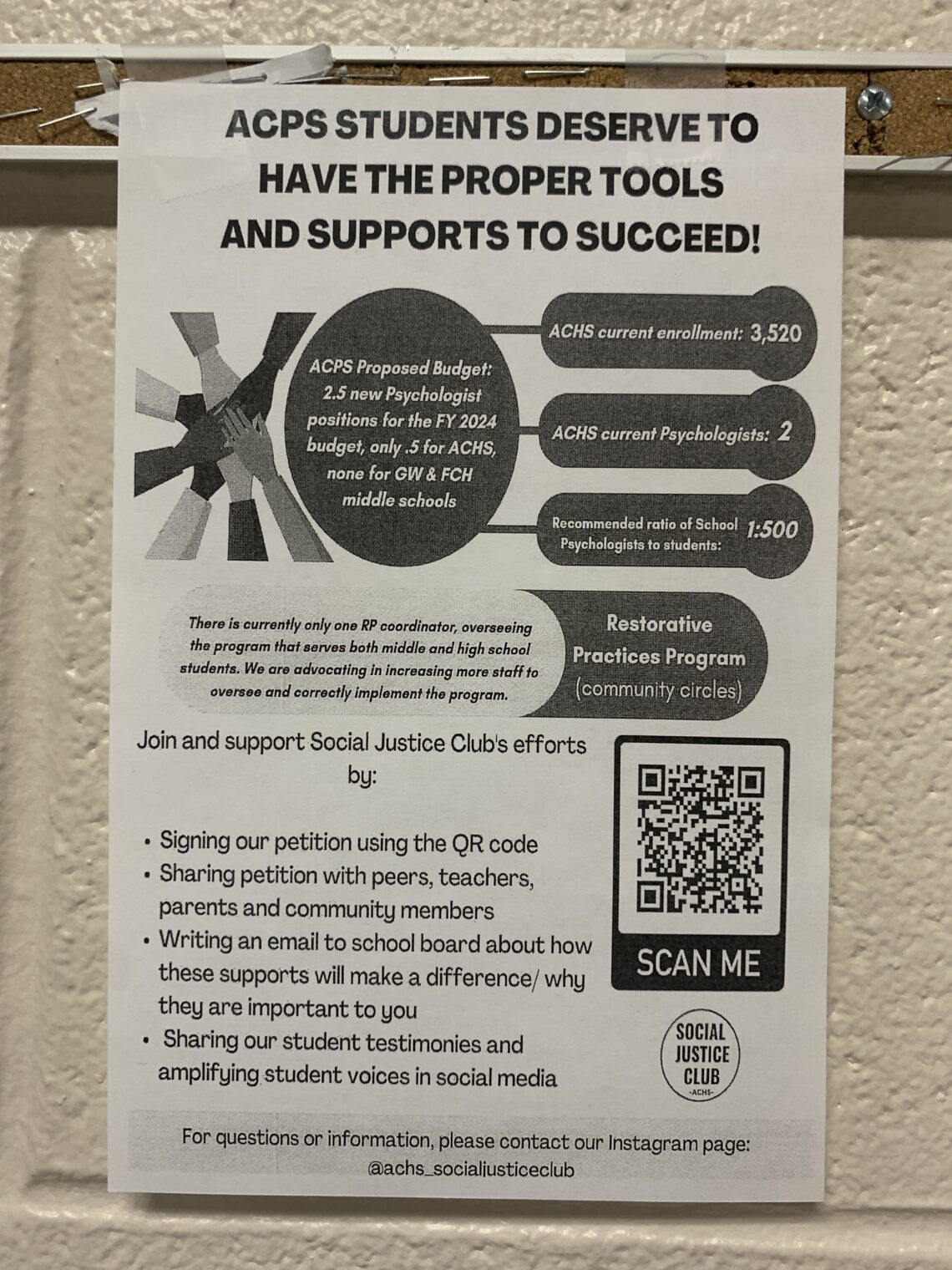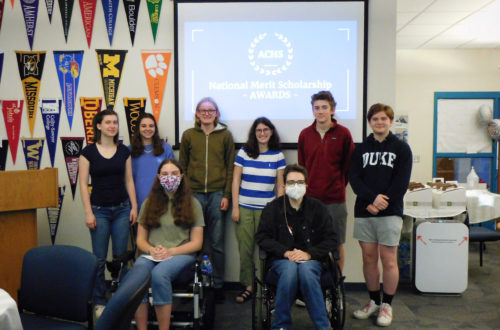Sarah Porter
Staff Writer
ACPS’s new budget proposal highlights the continued student need for effective administrative techniques and school resources.
To address the effects of the COVID-19 pandemic on ACHS students, administration and faculty have implemented policies to ease stress since 2020. For example, during the 2021-22 academic year, students could not lose points for submission of late work up to two weeks after the due date. Additionally, final exams that did not raise their grade were exempt from students’ final grade reports.
These policies aided students as they transitioned from online to in-person learning, easing stress and allowing students to seek out mental health resources as needed. However, this school has since moved away from any pandemic-related school policies. For the 2022-23 academic year, completed late work can lose points at the teachers’ discretion and final exams will count toward students’ final grades, no matter their score.
Though these changes reflected the school’s attempt to move on from the pandemic and back into the traditional learning environment, this shift demonstrates the school’s failure to continue to acknowledge and meet student needs. The final nail in the coffin appeared in the 2023 budget proposal, which was presented to the school board on January 5th. The School Board voted on and approved the budget on February 16th. Next, it will move on to the City Council for final approval on May 3rd.
The process of school budget creation starts each year with a review of student data to determine where gaps, if any, exist. Based on this information, the school designates funding toward priority areas.
“Decisions are made to fund the priorities that will help improve ACPS and benefit our students,” said ACPS Financial Chief Officer Dominic Turner.
Currently, according to Turner, ACPS’s new funding proposal directs 1.8 psychologists for the entire Minnie Howard campus of ACHS, with over 1,000 students alone. Furthermore, 4.8-three psychologists are designated to support the over 3,000 students at the King Street Campus.
Junior and Social Justice Club President Akilah Ross says, “I personally have not had a safe person to talk to in the school. Whenever I was not having the best day, there wasn’t anyone that I would have been able to talk to about it that would give advice and solutions.”
Francis C. Hammond (FCH) and George Washington (GW) Middle Schools also only have one psychologist each, despite serving 1,380 students at GW and 1,499 students at FCH. Collectively, both schools have 2,879 students.
“Psychologists were added throughout ACPS to bring the overall caseloads at each school to a more manageable level,” said Turner.
According to survey data collected from the 2021-22 school year at ACPS, 70% of ACPS students said they “did not participate in community circles on at least a weekly basis.” Only 40% of students responded that “community circles were used to resolve conflict between students.”
Community circles provide students with the ability to share personal struggles or even successes with mental health. However, when implemented improperly, community circles can create an uncomfortable space wherein students become more deterred from accessing mental health resources.
To address student mental health needs, ACPS implements a Student Support Team (SST).
“[The SST] includes ACPS school counselors, school psychologists, school social workers and school nurses. [They] are trained to support students with Tier 2 and Tier 3 interventions. Tier 2 and Tier 3 interventions can be delivered in small groups or via individual meetings with students. When students require additional services beyond what the school and SST can offer, these students are referred for additional mental health support through ACPS’ partnership with community providers,” said ACPS Chief of Student Services and Equity Dr. Marcia Jackson.
Ross notes that the teachers are successful in building positive relationships with students to make the classroom feel safe, but there is more to be done.
“In the school system, I don’t seek out anyone, to be frank, because there aren’t many administrators I know or ones I would trust enough to talk to. I think the school fails to try to get the message across that they actually “care” because they feel mental health is a priority, but their actions say otherwise,” said Ross.
“Every time I felt overwhelmed with anxious thoughts, or had depressive episodes, I would visit my school counselor, and not once did they ever refer me to a school psychologist. [After joining Social Justice Club], I learned that not only was there an extremely low number of [psychologists] compared to how many students there were in the school but there was also no easily accessible information in order to get in contact with them,” said Jordan Holmes.
In eleventh grade, Holmes sought emotional support from her counselor who allowed her to complete schoolwork in her office on days she struggled with her mental health. With her counselor’s aide, they created a 504 plan wherein she could take tests with additional time in her academy location to reduce anxiety-causing stressors in her environment. However, this support method did not continue for her Scholastic Aptitude Test (SAT) and Advanced Placement (AP) tests.
“[The situation showed me] one of the gaps that come with the school’s support,” said Holmes.
To address and combat these issues, the Social Justice Club holds meetings to discuss the current budget proposition and the changes the club would like to see. In addition, members have met with the ACPS School Board to voice their concerns and offer solutions.
“With the Social Justice Club, I’ve gotten the chance to speak about these issues and my experiences with School Board members. At times, it felt like I was speaking to a brick wall, but at others [times], I felt like I was really heard by the School Board members and felt a sense of hope that something would change,” said Holmes.
“Having a substantial amount of psychologists for the [number] of students that are in the school would be helpful for anyone who may be suffering from mental illness. This will not fix everything, but just having someone to talk to can go a long way,” said Holmes.
According to Turner, “Psychologists are just one member of the Student Support Team (SST). The Virginia standard of quality (SOQ) is three SST positions per 1000 Students (or one per 333.33 students). ACPS staffs at a ratio of better than one SST position for every 200 students.”
To share your thoughts on this matter, please consider emailing a School Board member to share how this budget proposal will impact you. Also, consider signing the Social Justice Club’s petition at this link: https://www.tenantsandworkers.org/twu_petition_for_ed_justice.
Featured image taken by Sarah Porter.






